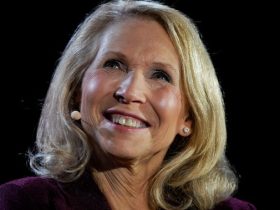Southwest Airlines on Tuesday said it will appeal a Texas federal judge’s unusual order requiring three of its senior lawyers to attend “religious liberty training” by a prominent conservative Christian legal group.
The airline in a statement confirmed that it would file an appeal one day after U.S. District Judge Brantley Starr said the lawyers had undermined his earlier ruling in a religious bias case by Southwest flight attendant Charlene Carter.
Starr said that instead of notifying employees of their rights against religious discrimination, as he had ordered Southwest to do, the lawyers penned a memo warning workers not to violate the company policy that led it to fire Carter.
Carter says she was fired for criticizing her union’s decision to participate in the 2017 Women’s March, a nationwide protest following the inauguration of former President Donald Trump, because Planned Parenthood was a sponsor. Carter has said she is a Christian who opposes abortion.
Starr, a Trump appointee, gave the lawyers until Aug. 28 to attend an eight-hour training conducted by Alliance Defending Freedom (ADF), which is routinely involved in high-profile court cases on abortion and religious liberties.
ADF has spearheaded efforts to restrict the availability of abortion pill mifepristone and helped draft a Mississippi abortion ban upheld by the U.S. Supreme Court in its June 2022 ruling eliminating women’s constitutional right to abortion.
Southwest in its statement did not elaborate on the basis for its appeal.
Carter is represented by the National Right to Work Legal Defense Foundation, a conservative worker advocacy group. Mark Mix, the group’s president, said Monday’s ruling “shuts down Southwest Airlines’ bald-faced attempt to dodge its responsibility to inform flight attendants of its wrongdoing.”
Judges often require employers to take steps to remedy discriminatory conduct, such as training workers and adopting new policies, but it is unusual for them to order company officials to undergo training conducted by specific groups. Starr cited older rulings requiring lawyers to attend continuing education or ethics training.
The ruling may be unprecedented, and the choice of ADF to conduct the training is troubling given its history of advocating a conservative Christian viewpoint, according to David Lopez, who was general counsel of the U.S. Equal Employment Opportunity Commission (EEOC) during the Obama administration.
That could interfere with the lawyers’ constitutional rights, he said, especially if they practice other religions.
“The court is moving into some really dangerous territory here,” said Lopez, who is now a law professor at Rutgers University in New Jersey.
But Andrea Lucas, a current EEOC commissioner appointed by Trump, said the case highlighted that many companies view workers’ religious liberty as an afterthought.
“Companies and their lawyers should take findings of religious discrimination as seriously as discrimination based on race (or) sex,” Lucas said.
ADF’s chief legal counsel, Jim Campbell, said the group was “happy to help” by providing training on laws barring religious discrimination.
“Every company should respect religious liberty and diverse viewpoints in the workplace,” Campbell said in a statement.
Southwest has maintained that Carter was fired for harassing coworkers about the Women’s March on social media in violation of a company “civility policy.”
A jury last year found that Southwest and Carter’s union had engaged in religious discrimination. Starr ordered them to pay Carter more than $800,000 and reinstate her to her job.
Southwest and the union are appealing that decision, which also required the airline to notify employees of their right to express their religious views on social media.
Starr on Monday said Southwest flouted that order by instead telling employees that “the court ordered us to inform you that Southwest does not discriminate against our employees for their religious practices and beliefs.”
Southwest in a memo drafted by the three lawyers — Kerrie Forbes, Kevin Minchey, and Chris Maberry — also defended Carter’s firing and said it would continue enforcing its social media policy.
Reuters reporting by Daniel Wiessner in Albany, New York; Reuters editing by Deepa Babington and Jonathan Oatis






